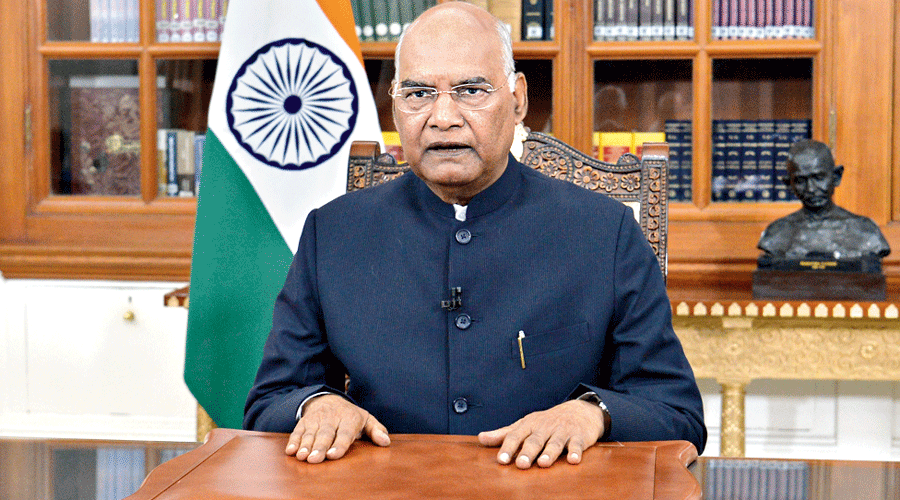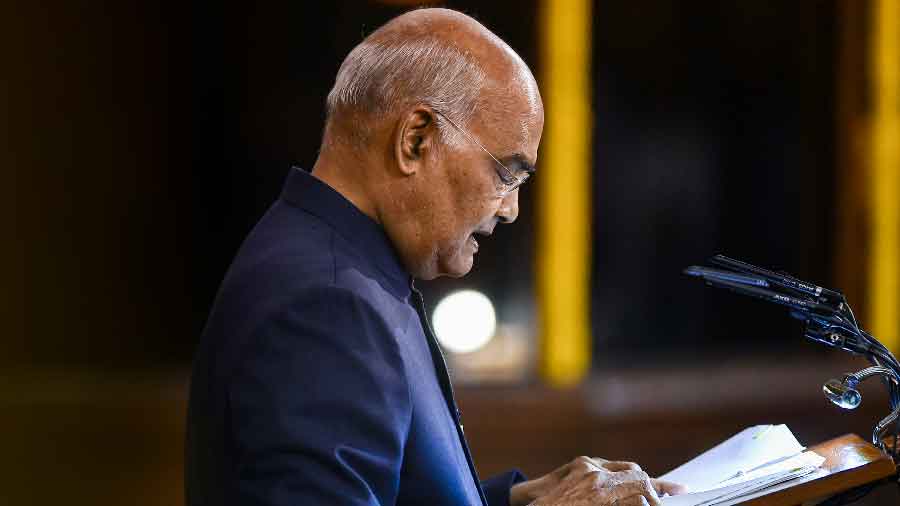President Ram Nath Kovind signed off from helmsmanship of the republic on Sunday night miming a tribute to constitutional values that were maimed on his watch from atop Raisina Hill over the past five years.
The outgoing President urged his fellow citizens to follow in the footsteps of the founders of “our modern nation” that exemplified the meaning of “justice, liberty, equality and fraternity’’.
“These principles of liberty, equality and fraternity are not to be treated as separate items in a trinity. They form a union of trinity in the sense that to divorce one from the other is to defeat the very purpose of democracy,” Kovind said on Sunday in his farewell address, quoting B.R. Ambedkar to say India must not be content with mere political democracy.
Kovind’s tenure as First Citizen witnessed unprecedented assaults on the freedoms of the citizenry, unabashed trampling of egalitarian values and alarming sanction to majoritarian prejudice.
It was a period in which a cultist regime faced charges of proceeding unhindered to establish the contours of a harsh, and very often uncaring, State.
Among the litany of accusations that the government faced: democratic dissent was hounded and tormented; social discord was virulently endorsed; the most fundamental human values were flagrantly violated; and the State, often, became the agency to traumatise the citizenry.
Yet, Kovind did not echo K.R. Narayanan, the 10th President who gave voice to the nation’s outrage when Australian missionary Graham Staines and his two young sons were burnt alive in Odisha in 1999.
Narayanan had no hesitation then in describing the ghastly murders as “a monumental aberration of time-tested tolerance and harmony. The killings belong to the world’s inventory of black deeds.”
Not that the tenure of Kovind, the 14th President, was short on gut-wrenching events.
The countless harried migrants left to fend for themselves in the first killer spell of Covid; the denial of basic amenities to the frail and dying Father Stan Swamy; the tyranny wreaked upon anti-CAA/ anti-NRC protesters across the geography, particularly in Adityanath’s Uttar Pradesh; the brutal rape and murder of a Dalit girl in Hathras and the criminal destruction of evidence by uniformed agencies of the state; the protection extended to sectarian dog-whistlers, the persecution of those who waged battle against them….
Umar Khalid’s internment has become a global cause célèbre. Siddique Kappan is being made an example of what may visit you if you are the wrong person in the wrong place attempting the wrong thing, so to speak.
There was too, during Kovind’s vigil, the brutal diminution of the state and people of Jammu and Kashmir, an enactment that probably became a modern-era exemplar in how democracies should not work.
Kovind did issue an appeal for peace after the Dera Sacha Sauda chief was found guilty in a rape case in 2017. But the President has largely been silent on the issues linked to propagation of hate.
On Sunday, President Kovind dwelt on the 75th anniversary of India’s Independence — being celebrated by the Narendra Modi government as Azadi Ka Amrit Mahotsav — and said that the names of many of the heroes who brought hopes of a new dawn during the freedom struggle had long been forgotten. “Contributions of some of them have come to be appreciated only in recent times. Around the turn of the century, the various struggles were coming together, creating a new consciousness,” Kovind said.
Although the Modi government is usually reluctant to name the country’s first Prime Minister Jawaharlal Nehru in the pantheon of founding fathers, the President included him in his speech and named Jana Sangh founder Syama Prasad Mookerjee in the same breath.
“I have always strongly believed that no other country has been as fortunate as India in having a galaxy of leaders, each of whom was an exceptional mind, within a span of a few decades in the early twentieth century. Gurudev Rabindranath Tagore, like a modern-day ‘rishi’, was at work to help us find our cultural roots again, while Babasaheb Bhimrao Ambedkar was vigorously advocating the cause of equality that was unheard of in most advanced countries.
“From Tilak and Gokhale to Bhagat Singh and Netaji, from Jawaharlal Nehru, Sardar Patel and Syama Prasad Mookerjee to Sarojini Naidu and Kamaladevi Chattopadhyay — nowhere in the history of humankind have so many great minds come together for a common cause.”












